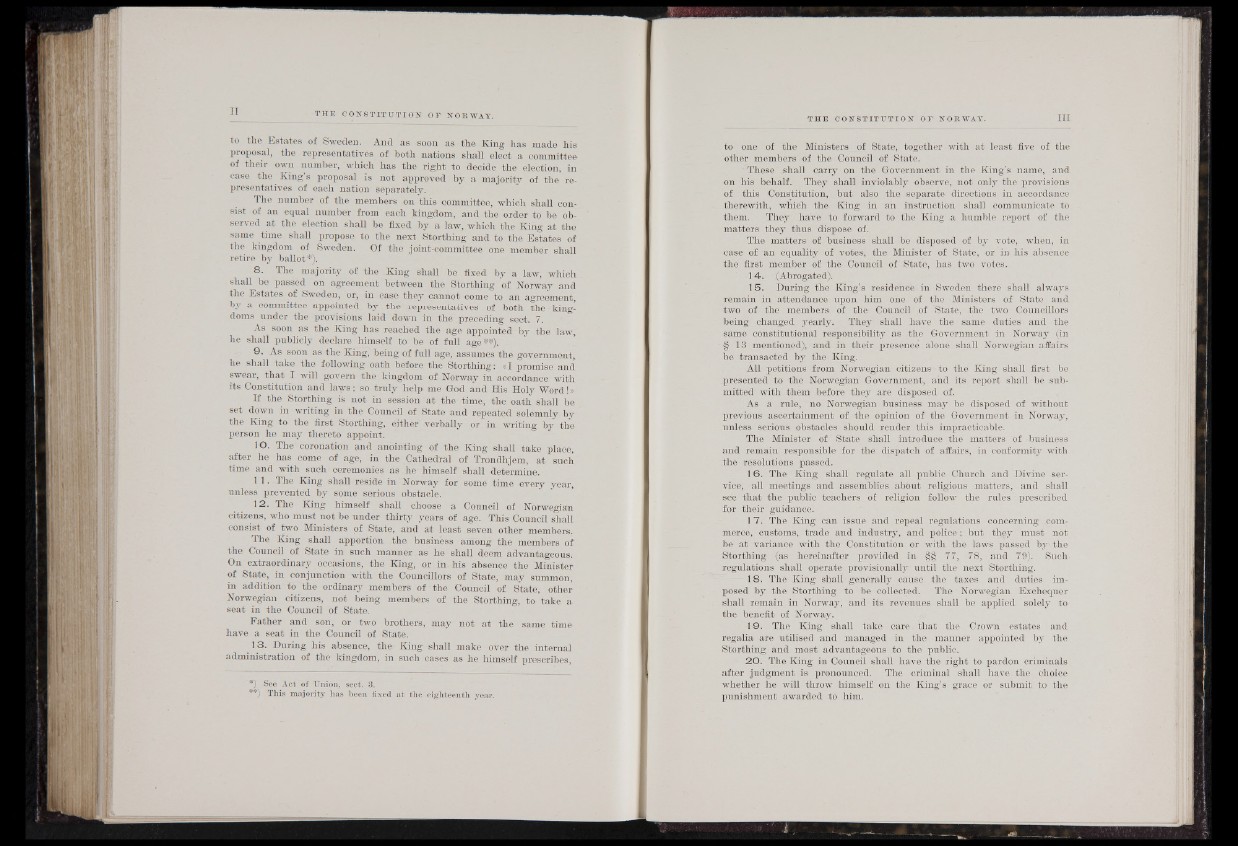
to the Estates of Sweden. And as soon as the King has made his
proposal, the representatives of both nations shall elect a committee
of their own number, which has the right to decide the election, in
case the King s proposal is not approved by a majority of the re-
presentatives of each nation separately.
The number of the members on this committee, which shall consist
of an equal number from each kingdom, and the order to be observed
at the election shall be fixed by a law, which the King at the
same time shall propose to the next Storthing and to the Estates of
the kingdom of Sweden. Of the joint-committee one member shall
retire by ballot*).
8. The majority of the King shall be fixed by a law, which
shall be passed on agreement between the Storthing of Norway and
the Estates of Sweden, or, in case they cannot come to an agreement,
by a committee appointed by the representatives of both the-kingdoms
under the provisions laid down in the preceding sect. 7.
As soon as the King has reached the age appointed by the law,
he shall publicly declare himself to be of full age**).
9. As soon as the King,' being of full age, assumes the government,
he shall take the following oath before the Storthing: «1 promise and
swear, that I will govern the kingdom of Norway in accordance with'
its Constitution and laws; so truly help me God and His Holy Word!»
If the Storthing is not in session at the time, the oath shall be
set down in writing in the Council of State and repeated solemnly by
the King to the first Storthing, either verbally or in writing by the
person he may thereto appoint.
10. The coronation and anointing of the King shall take place,
after he has come of age, in the Cathedral of Trondhjem, at such
time and with such ceremonies as he himself shall determine.
1 1. The King shall reside in Norway for some time every year,
unless prevented by some serious obstacle.
12. The King himself shall choose a Council of Norwegian
citizens, who must not be under thirty years of age. This Council shall
consist of two Ministers of State, and at least seven other members.
The King shall apportion the business among the members of
the Council of State in such manner as he shall deem advantageous.
On extraordinary occasions, the King, or in his absence the Minister
of State, in conjunction with the Councillors of State, may summon,
in addition to the ordinary members of the Council of State, other
Norwegian citizens, not being members of the Storthing, to take a.
seat in the Council of State.
Father and son, or two brothers, may not at the same time
have a seat in the Council of State.
13, During his absence, the King shall make over the internal
administration of the kingdom, in such cases as he himself prescribes,
*) See Act of Union, sect. 3.
*•) This majority has been fixed a t the eighteenth year.
to one of the Ministers of State, together with at least five of the
other members of the Council of State.
These shall carry on the Government in the King’s name, and
on his behalf. They shall inviolably observe, not only the provisions
of this Constitution, but also the separate directions in accordance
therewith, which the King in an instruction shall communicate to
them. They have to forward to the King a hiimble report of the
matters they thus dispose of.
The matters of business shall be disposed of by vote, when, in
case of an equality of votes, the Minister of State, or in his absence
the first member of the Council of State, has two votes.
14. (Abrogated);/ -
15. During the King’s residence in Sweden there shall always
remain in attendance upon him one of the Ministers of State and
two of the members of the Council of State, the two Councillors
being changed yearly. They shall have the same duties and the
same constitutional responsibility as the Government in Norway (in
§ 13 mentioned), and in their presence alone shall Norwegian affairs
be transacted by the King.
All petitions from Norwegian citizens to the King shall first be
presented to the Norwegian Government, and its report shall be submitted
with them before they are disposed of.
As a rule, no Norwegian business may be disposed of without
previous ascertainment of the opinion of the Government in Norway,
unless serious obstacles should render this impracticable.
The Minister of State shall introduce the matters of business
and remain responsible for the dispatch of affairs, in conformity with
the resolutions passed.
16. The King shall regulate all public Church and Divine service,
all meetings and assemblies about religious matters, and shall
see that the public teachers of religion follow the rules prescribed
for their guidance.
1 7. The King can issué and repeal regulations concerning commerce,
customs, trade and industry, and police; but they must not
be at variance with the Constitution or with the laws passed by' the
Storthing (as hereinafter provided in §§ 77, 78, and 79). Such
regulations shall operate provisionally until the next Storthing.
18. The King shall generally cause the taxes and duties imposed
by the Storthing to be collected. The Norwegian Exchequer
shall remain in Noxway, and its revenues shall be applied solely to
the benefit of Norway.
19. The King shall take care that the Crown estates and
regalia are utilised and managed in the manner appointed by the
Storthing and most advantageous to the public.
20. The King in Council shall have the right to pardon criminals
after judgment is pronounced. The criminal shall have the choice
whether he will throw himself on the King’s grace or submit to the
punishment awarded to him.